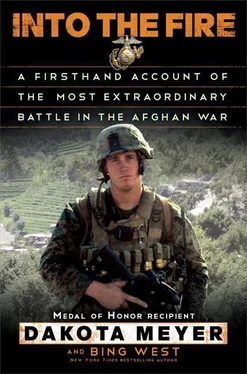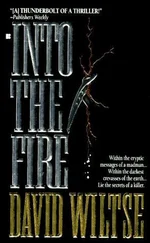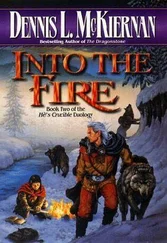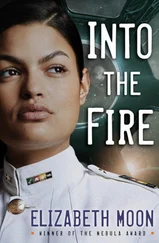After that, I drifted over to the Afghan mess hall, dumped some rice and carrots on a cardboard tray, and climbed up to the roof. Hafez came up, with several Askars behind him. We didn’t say much as the sun went down.
When I arrived at Monti the next day, Lt. Kerr told me he had wanted to throw up when he heard how the TOC had stiffed us. All the soldiers at Monti felt the same way. They all offered to help pack up my guys’ personal belongings.
“I appreciate it,” I said, “but they’re my brothers. I have to do it.”
When I walked into the hooch, all the gear was scattered about, exactly as we had left it. Lt. Johnson’s skimpy PT shorts that we all kidded him about were on his rack, Doc Layton’s CDs on the table, and Staff Sgt. Kenefick’s computer on his rack.
Maj. Williams had sent Bokis and Staff Sgt. Richards up to Monti with me. Together we sorted, marked, and stored the belongings of my brothers. After that, I walked outside, fidgeted around, and finally went into the ammo bunker to count up our munitions and keep myself busy. I heard a gunshot over at the burn pit and what sounded like my pup Annie yelp, then another gunshot.
There was an order to shoot all dogs on base, but the 1st sergeant in the ops center had assured me Annie would be fine. Still, after the shots, I walked outside and called for her.
A sergeant was rounding the corner with his shotgun slung.
“That wasn’t my dog you shot, was it?” I asked.
“No, it wasn’t yours,” he replied, trying to get around me.
“Let’s make sure,” I said.
We walked around the corner, and I looked at her lying on top of the burning trash.
“You motherfucker,” I said, “how about I lay your stupid ass down and shoot you ? She was giving you kisses and wagging her tail while you carried her over here and shot her twice, wasn’t she—you piece of shit!”
“First sergeant ordered me to do it,” he said.
“He did what?” I said as I walked off.
I stormed down the hill, looking for the man. Gunny Kevin Devine, Kerr’s platoon sergeant, saw me and fell in step beside me. He knew what had happened.
“Be cool, Devil Dog,” he said. “Don’t fuck up your life.”
The 1st sergeant who had killed Annie was standing outside the ops center, smoking a cigar, with a stupid smirk on his dumbass face. As I headed for him, Gunny Devine, who had twenty pounds of muscle on me, grabbed my shoulder. He made it plain he was going to wrestle me to the ground. I settled for smacking the sandbag next to the 1st sergeant’s face, and Devine pulled me away before I committed a court-martial offense.
It probably wasn’t a good idea that I was bunking in the hooch. Bokis and Sgt. Richards were good company, but I didn’t want them to think they had to babysit me. The first few days back, I avoided even trying to sleep. As long as I was awake and doing something, I thought I was okay.
Each night, Kerr and Devine led their platoon—a platoon of strong men—through hours of pain in the weight room, and they dragged me along. My muscles were burning and Kerr was yelling for one more lift and then another. The pain was a relief. It stopped my thinking.
After the others showered and turned in, I’d wander around the quiet base, visiting with the Askars in the sentry tower, improving my Pashto. A few new advisors moved into the hooch. I never got close to them. My bad. I was standoffish—didn’t feel at ease with them. I didn’t want any new friends.
As to Ganjigal: Some Special Forces teams entered the village in the late afternoon, many hours after the ambush. By then, the Taliban had collected their dead and wounded and hiked back into Pakistan.
Ganjigal was one of the deadliest small-arms battles of the Afghanistan war. We lost five advisors. In addition to Team Monti, Army Sgt. 1st Class Westbrook had died of his wounds. Eight Askars were killed and thirteen seriously wounded by rifle, machine-gun, and RPG fire. Enemy losses to small arms were probably of a similar number. There were no IEDs, no bombs, and very few artillery shells. Bullets caused most of the casualties. Ganjigal was a mountain fight from an earlier century.
The Taliban leader, Rahman, crowed over the Taliban radio about his great victory. But the American and Afghan commanders decided not to launch a retaliatory raid; they didn’t want to draw attention to our defeat and to the lack of fire support. I thought their passive approach was wrong. If you were a villager anywhere in Kunar Province, what would you think after Ganjigal? We should have hit back at a Taliban camp.
The Askars decided they could not trust the Americans to support them. So they didn’t want to patrol unless they were accompanied by U.S. Army soldiers, not just advisors. As for the Americans, Capt. Paco Bryant, the commander of Dog Company, didn’t want to send his soldiers into a village like Ganjigal if they weren’t going to hold it.
“As soon as you leave, it will be back in enemy hands within two or three days,” he said, “and that’s not worth a soldier’s life.”
The U.S. high command decided that any patrol into a capillary valley like Ganjigal required helicopter support, and a PowerPoint brief sent to battalion and brigade headquarters. As a result, the pace of patrolling by Askars and by Americans dropped dramatically.
Finally, I had another chance. Col. Daniel Yoo, the senior Marine advisor, paid a visit to Monti. I knew he had come a long way to check up on me, and I appreciated his thoughtfulness. We were talking in my hooch when an alert came over the tactical radio: an Army convoy had been ambushed north of Monti. Lt. Kerr and Capt. Bryant, the company commander, were on their way to assist.
I looked at Col. Yoo, who nodded in agreement. Minutes later, Yoo, Bokis, Staff Sgt. Richards, some of the colonel’s guys that came with him, a dozen Askars, and I were headed out the gate. We drove a few miles north and stopped at the top of a rise. On our right was the Kunar River. On our left was a towering ridgeline. Two hundred meters to our front was a narrow valley called Dab Khar, a favorite ambush site—steep sides, narrow roadbed. I had fought there before, alongside Staff Sgt. Jeffords.
The valley cut a deep V slice out of the ridgeline. At the bottom of the V, jingle trucks were jammed against each other like a massive traffic accident. Three twelve-wheelers were lying on their sides, burning. Four others, banged up, were parked at crazy angles. Mixed among them were four U.S. Army MRAPs—big armored vehicles—and an armored Humvee.
PKMs and AKs were hammering down on this mess, with little return fire. It would be crazy to drive into that tangle of vehicles. Bokis was on the MK19 on our truck. He couldn’t shoot because of the angles of fire.
Richards stayed in the driver’s seat while I advanced on foot by bounds into the wreckage. Our Askars ran forward with us, but their light M16s didn’t impress the Taliban machine-gun crew. I was quickly pinned behind a disabled truck. Looking up, I could see the PKM was shooting from a thick stone house two hundred meters upslope. Excited to have a target so close, I fired about five shells from my grenade launcher before my common sense kicked in.
What am I doing? I thought. I’m outmatched by a machine gun, but there’s an Army Humvee sitting next to me with no one in the .50-cal turret!
I signaled to Capt. Bryant, who had taken shelter behind another jingle truck.
“Why isn’t that truck returning fire?” I yelled.
Bryant shrugged, as baffled as I was. Kerr was hunkered down, radioing for air. He was famous for bombing the shit out of insurgents. Gunny Devine and Sgt. Hall were shooting with little effect at the PKM position. I ran over to the Army truck and banged on the hatch. There were bloody handprints all over the door, where the poor Afghan drivers had been banging and begging to be let in.
Читать дальше












